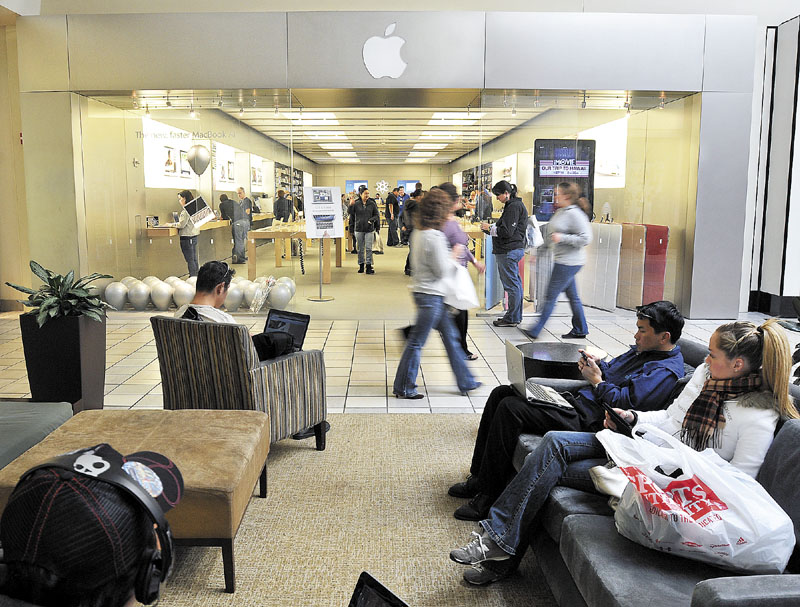The death of Apple’s CEO and co-founder cut a swath through Maine on Thursday — not just from tech fanatics, but from a wide segment of the public whose lives were inexorably affected by the iconic company’s user-friendly products.
Steve Jobs, co-founder of Apple Inc., died of a rare form of pancreatic cancer Wednesday at age 56.
An associate declined comment at Maine’s only Apple store, in South Portland, saying only that employees there were “pushing forward” after Jobs’ passing.
Michaela Wilkinson, a spokeswoman for Apple, said everyone is paying tribute to Jobs in their own way.
C. David Tobie of DataColor, a global company that develops software for Apple’s desktop and mobile platforms, said Jobs’ death weighed on the minds of his associates all day long Thursday.
“I have made several comments and read hundreds in the last 24 hours,” Tobie said. “There’s a depth of feeling, not just in the industry, but the population at large. It’s gone viral. It’s not just the geeks touched by Steve Jobs anymore, it’s the whole world.”
Invariably, he said, these comments were lofted back and forth across vast spaces using iPods, iPads, iPhones, iMacs and other Apple computing products, known for their sleek design, multimedia capability and ease of use.
Tobie, who lives in Mount Vernon and has an office in Readfield, said there probably would never be anyone one who did what Jobs did for the world.
“Which is not to say Apple won’t do well without his leadership, but we’ll miss that personal genius,” Tobie said.
“Did you hear Obama’s quote? He said perhaps the mark of Jobs’ brilliance is that the majority of people who learned about his death did it on a device created by Jobs,” Tobie said. “I don’t think any one of us knew how deeply this affected us until we heard the news.”
Carroll Ayer, an “Apple Ambassador” from Augusta who started the Capital Apple Macintosh Performa Users Group in 1993, said he never met Jobs, but had the highest respect for him.
“I think he had extraordinarily rare combination of intelligence, market vision and drive,” Ayer said Thursday. “And frankly, I think his accomplishments will rank up there with those of (inventor Thomas) Edison. I don’t think that’s an overstatement. He just had a knack for knowing what would sell, and the hallmark was everything of quality and extraordinary support.”
Ayer, a retired state employee, said he spent Thursday reading quotes Jobs made through the years.
He said Apple showed “a great knack for building what people wanted, before they knew they wanted it” under Jobs.
The state’s computer
Apple’s reach in Maine is broad.
The company provides products that run the state’s judicial system, help educate more than 33,000 students, and run critical functions for countless private industries, especially in the fields of media, arts and design.
Maine’s court system runs entirely on Apple platforms.
“We have been extraordinarily pleased with our Apples,” said Mary Ann Lynch, director of public information for the Maine Judicial Branch. “I’ve worked on PCs my entire life and just came to the court system three years ago. And now you couldn’t keep me away from Apple. It’s so far superior. We don’t have the viruses or are plagued by the problems PCs are plagued with.”
In a first-in-the-nation program begun in 2002, the state signed a $37 million contract with Apple that provided laptops to 33,000 middle school students and 3,000 teachers.
The contract was extended in 2006, then expanded in 2009 — even amid a huge budget crunch — to include some high schools.
Today, all seventh-graders, all eighth-graders and students at 55 percent of Maine’s high schools are issued laptops bearing the distinctive Apple logo with the half-moon bite.
Jeff Mao, learning technology policy director for the Maine Department of Education, said the program, known as the Maine Learning Technology Initiative, has had a significant impact on learning.
The program “provides an equity to students and teachers across Maine like no other program,” Mao said.
“Every middle school student has a powerful tool to empower learning, as well as access to the global community. This access provides opportunity for our students to connect, learn, explore and find their unique path to success that could not have happened without (it).”
Former Gov. Angus King, who enlisted Jobs’ interest in the initiative, described Jobs on Thursday as “the most important leader of his era,” saying his innovations rank with Edison and automobile pioneer Henry Ford.
King said Apple didn’t make any money on the program, which includes discounted laptops, wireless networking and support and mail-in repairs.
Jobs joined King in addressing students at Portland High School in June 2002 after the first Apple laptops arrived.
“Steve wanted to see this happen. It had always been a dream of his to see digital device in everybody’s hands,” King said. “We were the first people to really step up and make that happen.”
Jobs said the Maine contract “was one that we decided we just couldn’t lose.”
Through the years, King kept in touch with Jobs, last corresponding with him about a decision by Auburn schools to equip kindergartners with iPads.
“I believe Steve is the most important leader of our era,” King said. “Politicians come and go, but he actually changed the way people interact with the world, the way people see the world, the way people gain information from the world,” King said Thursday — via iPhone.
King made his push for the program saying it would help eliminate the “digital divide” between rich and poor kids.
Later, the program expanded into high schools, where educators jumped at the chance to implement Apple products in their classrooms.
“His products have enhanced and enriched education for students all over the world,” said Laura Richter, technology integrationist at Skowhegan Area Middle School. “Here in Skowhegan alone, we have benefited greatly through the one-laptop-per-child initiative that provides every middle level student in Maine with a Macbook.”
The year before the laptop initiative started, Richter — one of five “Apple distinguished educators” in Maine, who worked on the initiative before its inception — helped her middle school students create documentaries using Apple software known as iMovie.
The students later won awards on Maine History Day for their documentaries and went on to compete in Washington, D.C.
Jobs viewed the Skowhegan students’ documentary, “The Changing Face of Industry in Maine,” Richter said.
After viewing it, Jobs pronounced that “it was as high a quality as any he had seen in California schools,” she said.
In 2003, Richter attended an Apple educators event in Monterey, Calif., where Jobs was scheduled to speak, but participants received word he had been diagnosed with cancer and would not be able to attend.
It was a sad day, she recalled.”I know that many will miss his engaging press events, where his creative energy was an inspiration to all.”
Colleges feel imprint
Jobs’ imprint is all over Colby College, where 1,000 college-owned Macintosh computers glow in computer labs, and faculty and staff offices, throughout campus.
And associate director of communications Ruth Jacobs said approximately 70 percent of the 1,825 students at the four-year liberal arts college own their own Macs.
Brian Speer, director of integrated marketing and design at Colby, said he was studying design at Ohio University when the first Mac was unveiled in the 1980s.
“It changed the entire curriculum,” he said. “It put more power in the hands of the designer.”
At Thomas College, Jobs’ technology is also apparent: Lisa Auriemma, director of library services, said the library has a “rolling lab” with 27 iPads and another with 19 MacBooks.
Faculty and students can sign out one, some, or all of them.
Auriemma said 12 percent of Thomas’ 1,000 students use MacBooks and another 9 percent use other wireless Apple products, including iPhones, iPads and iPods.
“They are so beneficial,” she said of the products, citing students’ ability to download textbooks on iPads and stay in touch with family and friends while balancing school and work.
“I would have loved to have had the same ability when I went to school, but I went when dinosaurs roamed the earth,” she said. “It takes some stress out of their lives.”
Delivering information
Anthony Ronzio, editor and publisher of the Kennebec Journal and Morning Sentinel, said Apples are at the heart of the technology that produces the daily newspapers for more than 30,000 central Maine print subscribers and more who view content online.
“Apple’s products have revolutionized and disrupted every industry engaged in the creation and delivery of information, and will do so for years to come,” he said. “The real legacy of Steve Jobs is not understood today, but will become clear decades from now.”
Peter Johnson, president of Capitol Computers in Augusta, said his company has dealt Apple computers since 1983. “So we’ve been partners with them a long time.”
Johnson said Jobs’ success came from vision and perseverance and by surrounding himself with an excellent staff.
Apple’s products are more expensive, but you pay for quality, he said.
“They put the effort into making the product simple to use, but it had tremendous power behind it,” he said. “Their products were approachable. The other options have the power but don’t have that ease of use, that friendliness, that made them endearing.”
Associated Press writer David Sharp and Morning Sentinel staff writers Beth Staples and Amy Calder contributed to this report.
Mechele Cooper — 621-5663
mcooper@centralmaine.com
Send questions/comments to the editors.





Success. Please wait for the page to reload. If the page does not reload within 5 seconds, please refresh the page.
Enter your email and password to access comments.
Hi, to comment on stories you must . This profile is in addition to your subscription and website login.
Already have a commenting profile? .
Invalid username/password.
Please check your email to confirm and complete your registration.
Only subscribers are eligible to post comments. Please subscribe or login first for digital access. Here’s why.
Use the form below to reset your password. When you've submitted your account email, we will send an email with a reset code.